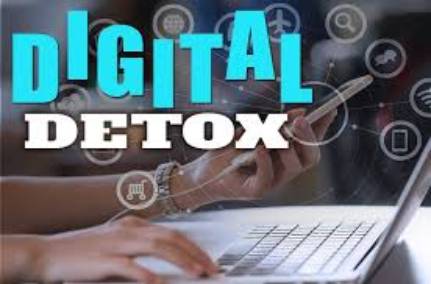Featured
- Get link
- X
- Other Apps
What is Digital Detox and Mindfulness? And, More
While technology can be beneficial, excessive screen time and constant connectivity can negatively impact our well-being. Regular breaks from digital devices and practicing mindfulness can help us maintain a healthy balance. Smartphone applications that track screen time and offer reminders for holidays can be invaluable in reducing excessive device usage. Mindfulness apps and guided meditation podcasts provide techniques for staying present and focused in an increasingly digital world.
Telehealth and Remote Monitoring:
Access to quality healthcare is crucial for maintaining good
health, but it is not always convenient or accessible. Telehealth services and
remote monitoring technologies bridge the gap, enabling individuals to connect
with healthcare professionals from their homes. Through video consultations and
remote monitoring devices, patients can receive medical advice, monitor chronic
conditions, and access preventive care, ultimately leading to better overall
health outcomes.
Mental Health Support:
Technology has also transformed the landscape of mental health support. Numerous online therapy platforms and mental health apps offer
accessible counseling services and tools for managing anxiety, depression, and
stress. In addition, virtual support groups and forums provide a sense of
community and a safe space for individuals to part their experiences and seek
guidance.
Mobile Apps for Nutrition and Meal Planning
Mobile apps have revolutionized the way we method nutrients
and meal making plans. With a plethora of apps available, people can
effortlessly song their meals consumption, access dietary facts, and acquire
personalised meal pointers. These apps regularly encompass features together
with barcode scanning, recipe databases, and calorie calculators, simplifying
the manner of making informed dietary choices. By imparting convenient get
admission to to dietary guidance, mobile apps empower users to expand more healthy
consuming habits and make conscious food selections.
Mindfulness and Meditation Apps
In our rapid-paced and worrying lives, cultivating
mindfulness and practising meditation has emerge as increasingly more critical.
Mindfulness and meditation apps offer guided meditation classes, respiratory
physical games, and rest strategies that may assist individuals reduce strain,
enhance awareness, and beautify general nicely-being. These apps regularly
offer customizable features, permitting users to tailor their meditation
exercise to their possibilities and desires. With normal use, those digital answers
enable individuals to include mindfulness into their day by day workouts and
increase a extra balanced and non violent mind-set.
Prioritizing Physical Fitness:
Regular exercise is crucial for maintaining a healthy body and mind. However, our busy schedules often make finding time for physical
activities difficult. Fortunately, several technological advancements have made
incorporating exercise into our daily lives easier. For example, fitness
trackers, smartwatches, and smartphone apps can monitor our activity levels,
count steps, and even provide personalized workout plans. Additionally, home
workout equipment, such as intelligent exercise bikes and interactive fitness
platforms, offers convenience and motivation for regular exercise routines.
Fitness Tracking and Wearable Devices
Fitness trackers and wearable gadgets have received
popularity for their potential to reveal and music various components of our
health and fitness. These devices offer actual-time comments on metrics like
steps taken, calories burned, coronary heart fee, and sleep styles. By keeping
customers aware about their interest ranges, these technology encourage bodily
hobby and help people set and achieve their health dreams. Additionally, many
wearable gadgets offer features like GPS tracking and exercise training, making
exercising greater engaging and effective.
Mindful Eating Habits:
Proper nutrition plays a vital part in our overall health.
In an era of fast food & processed snacks, it is essential to cultivate
mindful eating habits. Several mobile apps and websites provide nutritional
information, recipe ideas, and meal-planning tools to help us make informed
food choices. Additionally, intelligent kitchen appliances, like smart scales
and connected food storage containers, can assist in portion control and
minimize food waste.
Quality Sleep:
Adequate sleep is essential for our physical & mental
well-being. However, many of us struggle with sleep-related issues.
Fortunately, technology offers solutions to help improve the quality of our
sleep. For example, intelligent mattresses and sleep trackers can monitor our
sleep patterns, analyze the data, and provide personalized recommendations for
better sleep hygiene. Meditation apps and smart lighting systems can also
create a relaxing environment that promotes soothing sleep.
Stress Management:
Stress has become a prevalent concern in modern life, but it
is crucial to manage it effectively. Various technological tools can aid in
stress reduction and promote mental well-being. For example, meditation and
mindfulness apps guide users through relaxation techniques and breathing
exercises, enabling them to find moments of calm in their busy schedules.
Additionally, biofeedback devices can help monitor stress levels and provide
insights into stress triggers, allowing individuals to make necessary lifestyle
adjustments.
- Get link
- X
- Other Apps
Popular Posts
Watermelon for diabetics: Good or bad?
- Get link
- X
- Other Apps


Comments
Post a Comment